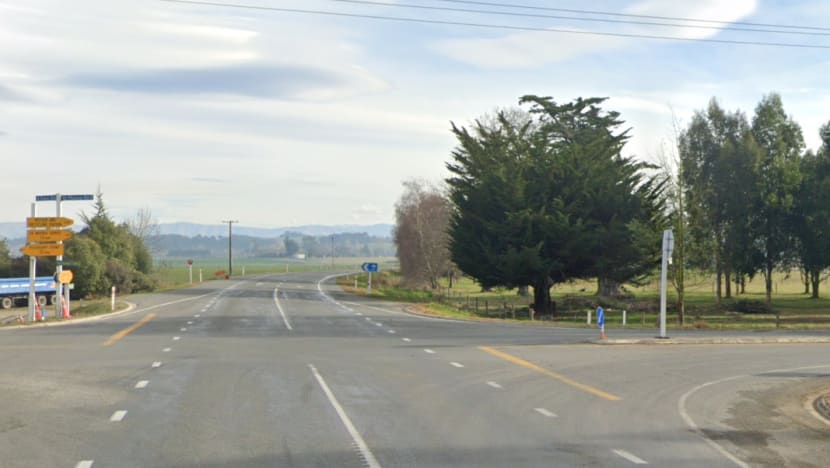Driver fatigue a factor in New Zealand campervan crash that killed 3 Singaporean students: Coroner
Findings show that the driver might have been awake for more than 12 hours.

A Toyota Hiace campervan.

This audio is generated by an AI tool.
SINGAPORE: Driver fatigue contributed to a road accident that killed three Singaporean students in New Zealand's South Island last year, with their deaths a result of smoke inhalation when their campervan caught fire.
A coroner's report, dated May 21 this year, revealed the findings. In New Zealand, coroner's findings are withheld for two weeks before being made public to give the families of the deceased time to access the information first.
On Apr 17, 2023, the National University of Singapore (NUS) undergraduates were travelling in a campervan when the vehicle crashed into a guardrail and rolled, catching fire minutes later and trapping them inside.
The accident took place at the intersection of State Highway 79 and Te Moana Road near the town of Geraldine, about 140km south-west of Christchurch.
The victims were identified as Ms Sherwin Chong, Ms Yang Xinyue and Mr Vincent Lim Jia Jun.
Ms Chong and Ms Yang, both 21, were studying at the University of Otago and the University of Auckland, respectively, at the time. Mr Lim was 24.
WHAT HAPPENED
On Apr 8, 2023, Mr Lim arrived in New Zealand for a two-week holiday and met Ms Chong in Christchurch, where they picked up a Toyota Hiace campervan. Mr Lim was identified as the primary driver on the rental agreement.
From there, they drove to Auckland to meet Ms Yang, and the three of them travelled back down New Zealand to sightsee.
The van could accommodate two passengers, with the driver in the front seat. CCTV footage captured their van at various locations as the three victims travelled around the country.
"This footage suggests that typically, two of them sat in the front while one travelled in the rear," said Coroner Alexandra Cunninghame.
From the footage, they went skydiving at Wanaka on Apr 15, and travelled through Lake Tekapo village the following day at 11.40pm.

On Apr 17, Ms Yang made an emergency call at 1.03am and told the dispatcher she was a passenger in a campervan with two friends and had been in an accident on the way to Geraldine.
The coroner added that Ms Yang said her friend was "caught" and could not get out of the vehicle, but did not mention which friend it was.
"Forty seconds into the call, Yang told the dispatcher that there was a fire. After this, screams and other noises could be heard, until the line went dead at about 3 minutes into the call."
Before the phone line went dead, emergency services were dispatched to the scene, identified as State Highway 79, about 2km from Geraldine.
At 1.13am, the first firefighters arrived to find the van rolled onto its driver's side and engulfed in flames.
After extinguishing the fire, first responders established that there was one person near the back of the van by the roof and two people in the front.
One was in the driver's seat, while the other had fallen toward it when the van rolled. All three bodies were so badly burnt that they could not be identified, said the coroner.
Ms Chong was then identified as the passenger in the rear of the van, while Mr Lim was in the driver's seat and Ms Yang in the front passenger seat.
DRIVER FATIGUE, FIRE
Senior Constable Aaron Tapp from the Canterbury Serious Crash Unit who investigated the crash found that the campervan was travelling at no less than 91kmh when it crashed into the guard rail barrier. The speed limit is 100kmh.
There was also no evidence to suggest that the vehicle had braked before the crash happened. No mechanical faults were identified when the campervan was tested.
The campervan was also in good condition, with cooking and sleeping space at the back, and three seats in the front with seatbelts.
Investigations revealed it was likely that fatigue was a cause of the crash, which occurred between midnight and 8am. This time frame is considered a "biological risk factor" for fatigue, noted Mr Tapp.
Additional indicators suggesting fatigue were identified as the crash involving a single vehicle on a straight segment of road, and the van leaving the road at a shallow angle without taking emergency action, such as braking or correcting.
Mr Tapp also noted that it was possible that the others in the vehicle may have been sleeping, while Lim had been awake for more than 12 hours due to the time of the crash.
According to investigations by Fire and Emergency New Zealand, all of the campervan's doors were closed when emergency services arrived. Due to the fire damage, it was not known whether any of the doors were locked when the crash took place.
Investigations found that a house battery near the wheel arch, which powered the living area of the campervan, was the likely cause of the fire after it was displaced as the vehicle collided with the road safety barrier.
The fire damage indicated that the fire started on or at floor level, in front of the wheel arch in the rear of the van and spread into the engine compartment.
CAUSE OF DEATHS
Post-mortem examinations revealed extensive charring on all three bodies and found that the deaths were caused by the effects of the inhalation of smoke and fumes in an enclosed space, said the coroner.
While Mr Lim suffered from bleeding between his brain and skull, and minor bruises to his lung, he did not have any fatal impact injuries. Ms Chong and Ms Yang did not have any life-threatening impact injuries.
Their blood tests for drugs and alcohol were also negative.
Mr Tapp said it was highly likely that the three individuals would have survived the crash had the campervan not caught fire.
The coroner noted that it was possible that the campervan doors were too difficult to open once it tipped onto its side, even though the evidence did not explain why the victims could not get out of the campervan after it crashed, as Ms Yang was able to make an emergency call.
The coroner added that the accident occurred late at night on a road in a rural area, with no bystanders present.
The emergency call taker also told Yang that emergency services were on their way within a very short time of her saying that a fire had broken out.
The coroner said that, given the remote location, it was not possible for an emergency vehicle to arrive in time to rescue anyone from the campervan before it caught fire or to contain the fire once it began.
"This tragic accident illustrates the importance of not driving when fatigued. All drivers, and particularly those who are planning road trips around New Zealand, must ensure that their itineraries allow sufficient time for rest and sleep so that they are not driving tired," said the coroner.
















